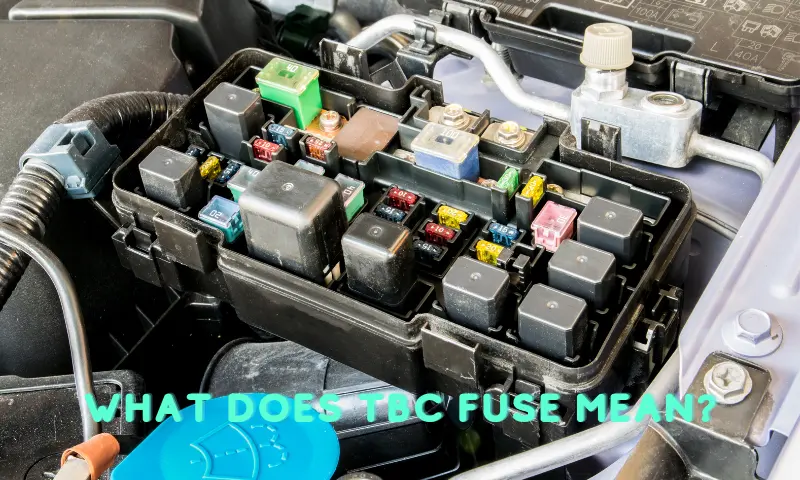Automobiles are designed with several fuses housed in a vehicle’s fuse box. The TBC is one of the most critical fuses that your vehicle cannot do without. When they work, you can rest assured the lights on your dash are protected from damage and dimness. On the flip side, when they blow, they cause great damage to several components in your car.
In this article, I explained what the TBC fuse means and its functions. I also shed light on why the fuse may blow intermittently and what remedy to apply.
What Does the TBC Fuse Mean and How Does it Work?
The TBC fuse stands for the “truck body computer” fuse. It is otherwise called the Body Control Module (BCM) fuse. These fuses have a range of amperage, depending on your car model or make. The TBC can be 10 amp, 15 amp, 20 amp, or more. The TBC 2A fuse is responsible for controlling the lights on the dashboard. It generally responsible for protecting the interior lights in your car.
Generally, the TBC fuse is a time-delay cartridge fuse that helps protect the dome lights from damage. They also provide protection to your car electronic devices against harm or electrical surge or dangerously high currents. By design, the TBC fuse is resistant to brief current surges that may occur during the start-up or operation of your car due to its time-delay feature. This is why the TBC is often installed as a circuit breaker. It works in a high-voltage situation like the dome lights. TBC fuses come in a wide range of sizes and ampere ratings, making them suitable for various applications in the car.
Where is the TBC Located?
You should be familiar with the location of all fuses in your vehicle and how to replace them if one of them blows. The fuse box in your vehicle can be found in various locations, the location of which is determined by the make and model of your vehicle. The following are some pointers to help you locate the fuse box in your vehicle:
You’ll find this TBC fuse beneath the left rear seat of your car. Actually, these component comes in two fuses which are under your car’s rear seat: the TBC 3 and TBC 4. Once you open the rear car seat, that is, the passenger seat, you will see the TBC seating under it.
If you can’t find it under the car seat, look for a small access panel on either side of the vehicle near the front. In most cases, this is where the secondary fuses for various electrical components, such as lights and accessories, are located. If you still have trouble finding the fuse box, consult the owner’s manual.
Why Does My TBC Fuse Blow?
Like every fuse in a car, the truck body computer (TBC) fuse is susceptible to blowing. Reasons? Your guess is as good as mine. Although there are several reasons the TBC fuse may blow, the following stand-out three causes are the most common.
Overloaded circuit
When an electrical circuit is overloaded, it is forced to deal with a current demand that exceeds its capacity. The circuit becomes overloaded when several electrical appliances or lights are used simultaneously.
The load capacity determines the dimensions of the fuse. The fuse will be blown if there is an excessive load. If the fuse continues to blow, it means that the circuit you’re using cannot handle the load you’re putting on it.
What to Do: An overloaded TBC will cause the TBC fuse to melt or blow. You will have to reduce the number of current loads you put on the fuse. Don’t forget, a blown TBC fuse will cause the dome lights not to work.
Wrongly connected radio Wire
One thing you should know is that if the radio is incorrectly wired, it may trigger the tbc battery fuse to still draw higher voltage (up to 166 volt) on your voltmeter. Ideally, the wire should connect to the dimming lights. Although this wire with black has a yellow or white stripe looks like a ground. If you mistakenly use it as a ground, it will blow your TBC fuse.
What to Do: Avoid using the radio wire as a ground.
Loose wiring
Even if there is only one faulty or loose connection in your car’s wiring system, the entire circuit can trip. The loose wires are typically located around fuel injectors which spray fuel into your car’s engine.
What to Do: If you notice that the wiring of the TBC is faulty, it’s time to fix it. Repair or replace any broken wire in your car’s TBC fuse. If you are unsure which wiring is tripping the circuit breaker, you should consult a qualified technician.
Shortened Harness
A shortened engine harness is another possible reason your TBC fuse may keep opening up, melting, or blowing. This harness runs into the car injector. A short circuit is formed when two or more live wires come into contact with one another or with another live conductor. A blown fuse caused by a shortened engine harness is a serious safety issue that puts your car and its components in severe danger.
What to Do: The thing to do is first find a short in the car’s wiring harness. A multimeter will help you measure resistance, voltage, and current. You can also use the multimeter and a power probe to locate the short in your car.
Final Thoughts
The TBC fuse is responsible for powering the “body control module” (BCM). Given this, it should be clear how critical it is to the vehicle’s operation. If a fuse blows, the power to your vehicle will almost certainly be cut off. As a result, understanding how to make a replacement for it if it breaks is critical. Always purchase the TBC fuse that corresponds to the make and model of your vehicle. Drive safely!

